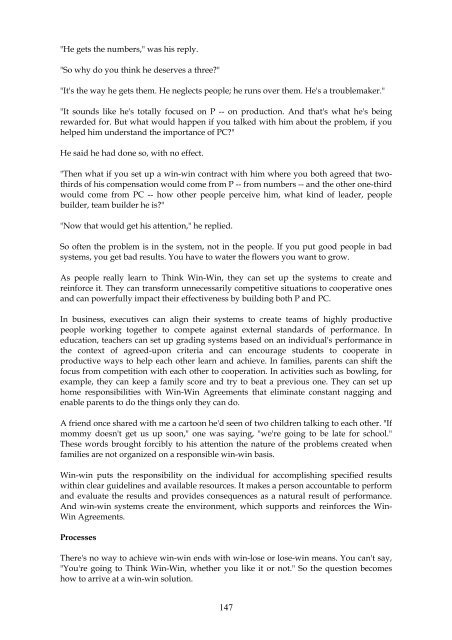Covey - The 7 habits of highly effective people
Create successful ePaper yourself
Turn your PDF publications into a flip-book with our unique Google optimized e-Paper software.
"He gets the numbers," was his reply.<br />
"So why do you think he deserves a three?"<br />
"It's the way he gets them. He neglects <strong>people</strong>; he runs over them. He's a troublemaker."<br />
"It sounds like he's totally focused on P -- on production. And that's what he's being<br />
rewarded for. But what would happen if you talked with him about the problem, if you<br />
helped him understand the importance <strong>of</strong> PC?"<br />
He said he had done so, with no effect.<br />
"<strong>The</strong>n what if you set up a win-win contract with him where you both agreed that twothirds<br />
<strong>of</strong> his compensation would come from P -- from numbers -- and the other one-third<br />
would come from PC -- how other <strong>people</strong> perceive him, what kind <strong>of</strong> leader, <strong>people</strong><br />
builder, team builder he is?"<br />
"Now that would get his attention," he replied.<br />
So <strong>of</strong>ten the problem is in the system, not in the <strong>people</strong>. If you put good <strong>people</strong> in bad<br />
systems, you get bad results. You have to water the flowers you want to grow.<br />
As <strong>people</strong> really learn to Think Win-Win, they can set up the systems to create and<br />
reinforce it. <strong>The</strong>y can transform unnecessarily competitive situations to cooperative ones<br />
and can powerfully impact their <strong>effective</strong>ness by building both P and PC.<br />
In business, executives can align their systems to create teams <strong>of</strong> <strong>highly</strong> productive<br />
<strong>people</strong> working together to compete against external standards <strong>of</strong> performance. In<br />
education, teachers can set up grading systems based on an individual's performance in<br />
the context <strong>of</strong> agreed-upon criteria and can encourage students to cooperate in<br />
productive ways to help each other learn and achieve. In families, parents can shift the<br />
focus from competition with each other to cooperation. In activities such as bowling, for<br />
example, they can keep a family score and try to beat a previous one. <strong>The</strong>y can set up<br />
home responsibilities with Win-Win Agreements that eliminate constant nagging and<br />
enable parents to do the things only they can do.<br />
A friend once shared with me a cartoon he'd seen <strong>of</strong> two children talking to each other. "If<br />
mommy doesn't get us up soon," one was saying, "we're going to be late for school."<br />
<strong>The</strong>se words brought forcibly to his attention the nature <strong>of</strong> the problems created when<br />
families are not organized on a responsible win-win basis.<br />
Win-win puts the responsibility on the individual for accomplishing specified results<br />
within clear guidelines and available resources. It makes a person accountable to perform<br />
and evaluate the results and provides consequences as a natural result <strong>of</strong> performance.<br />
And win-win systems create the environment, which supports and reinforces the Win-<br />
Win Agreements.<br />
Processes<br />
<strong>The</strong>re's no way to achieve win-win ends with win-lose or lose-win means. You can't say,<br />
"You're going to Think Win-Win, whether you like it or not." So the question becomes<br />
how to arrive at a win-win solution.<br />
147


